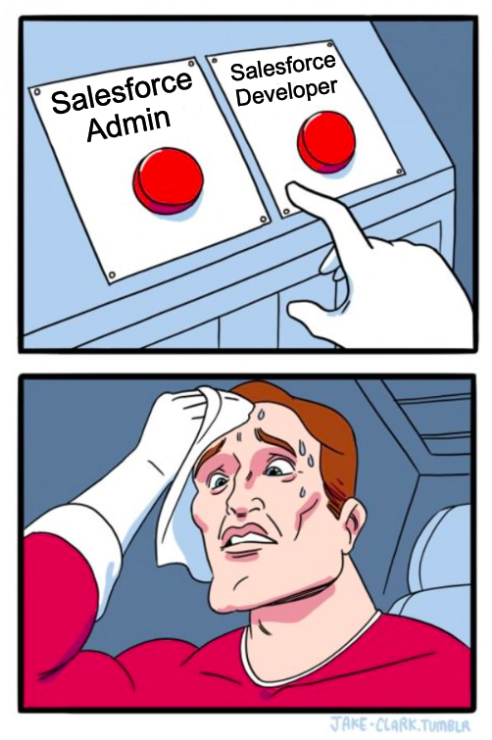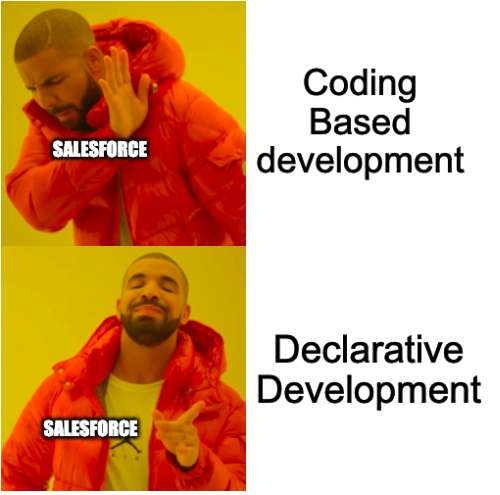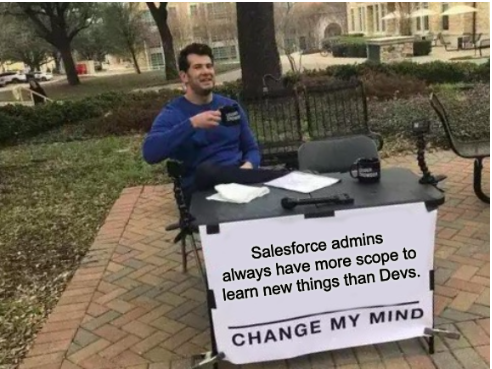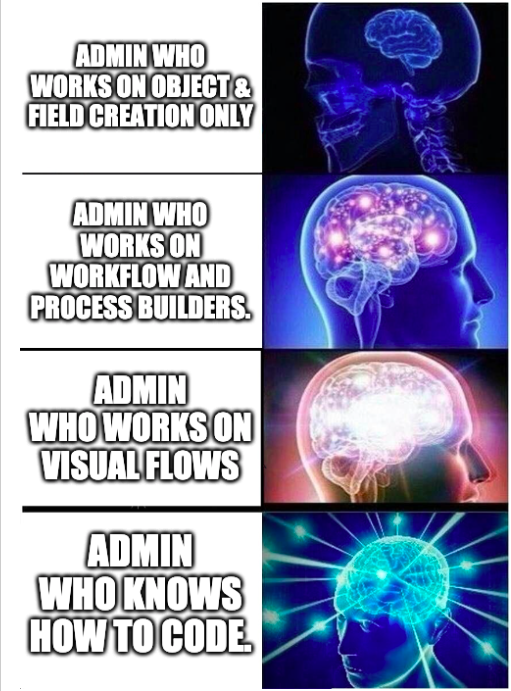By: Tejender Mohan

Image source: https://imgflip.com/
Are you a Salesforce Administrator who loves his/her job?
When you graduate with a technical degree and work as a Salesforce Admin, you come across forums / blogs / videos or suggestions from colleagues that you should try to move from a Salesforce Administrator role to a Salesforce Developer role for better career growth and opportunities, but do you really need to do that?
Not necessarily.
But why not?
Salesforce itself has a motive to keep the tool with no-code and low-code development capabilities. Salesforce supports easy configuration to solve requirements using point-and-click and with less code.
Considering that, if you want to grow in Salesforce Technologies, knowing about Salesforce’s declarative development functionalities is more important than knowing how to code any customization.

Image source: https://imgflip.com/
Then why so much hype about coding?
Well, there can be many reasons for that, but most importantly, learning code helps improve logical abilities & problem solving skills. These two skills will only benefit those who want to grow within the technological field.
If you compare a Salesforce Admin’s Role to a Salesforce Dev Role, you will find that the admins have more scope to learn new things, to build new solutions, as the tool itself has numerous features to handle almost every kind of business’s CRM.

Image source: https://imgflip.com/
Should I learn to code while working as a Salesforce Admin?
Most Salesforce Admins don’t start learning how to code because they have the perception that there are many experienced developers around who could do the work for them. What should be understood is, in Salesforce Technologies, to build robust solutions both the Admin and Dev need to be in sync. They should be able to understand each other’s way of building a solution. So the answer is yes; it is always beneficial for an Admin to learn coding and beneficial for a Dev to understand Admin tasks.
As Mahatma Gandhi said
“Live as if you were to die tomorrow. Learn as if you were to live forever.“

Image source: https://imgflip.com/
After all, Salesforce Development is a part of the Salesforce Work Domain, so, learning about the other side of your work domain will give you an edge over your peers. It will help increase your chances of advancing more in your career.
You never know, maybe like DevOps (Development+Operations), Salesforce domain could have a role called DevAdmin in the future.
How should I start my journey to learn to code?
Salesforce’s proprietary programming language is APEX but development in Salesforce will need knowledge about APEX, Javascript, HTML, and SOQL.
A beginner should start with APEX and SOQL language as most of the internal Salesforce customizations like the trigger, batches are built using these and it will be easier for a beginner to start and practice.
The first step when starting to learn a programming language is to learn the basics of that language. There are many websites to learn from but you may consider trailhead and start with the following:
https://trailhead.salesforce.com/content/learn/modules/apex-basics-for-admins
“Don’t start coding until you learn the basics and once you know the basics, never stop practicing and building the code.”
Never spend too much time on theory. You don’t need to memorize the syntaxes.
From the first week of learning, start building codes, build random problems and solutions on APEX code, from simple addition to any case study you have.
Explore articles, blogs, forums, and websites on Google to find solutions to your problems.
Just like we read books to improve our skills in foreign languages, read experienced developer’s code online to understand their logic and grasp their ways of coding.
https://developer.salesforce.com/forums?dc=Apex_Code_Development#!/feedtype=RECENT&criteria=ALLQUESTIONS&
https://salesforce.stackexchange.com/
https://www.geeksforgeeks.org/
Most importantly, always remember that no developer is perfect.
Sometimes, a new developer with the urge to learn new things and experiment new ways to develop can come up with a better solution than an experienced developer one who keeps following his old ways.

